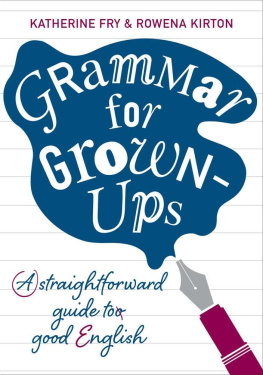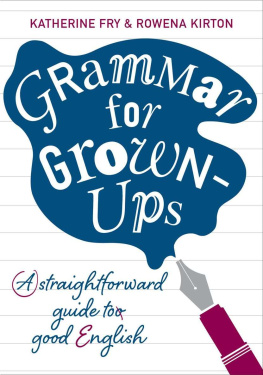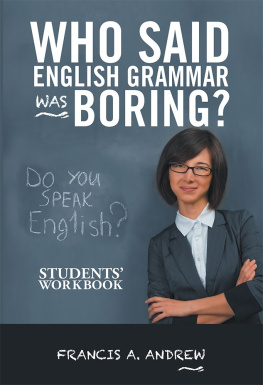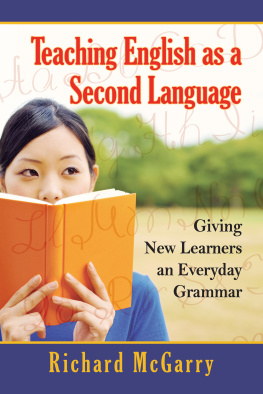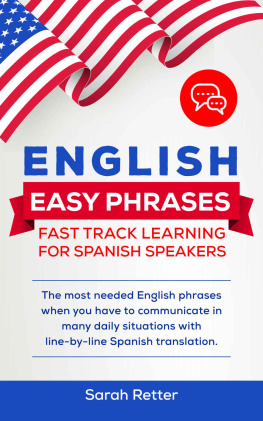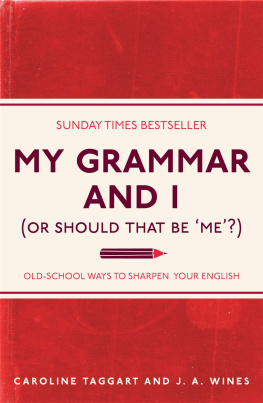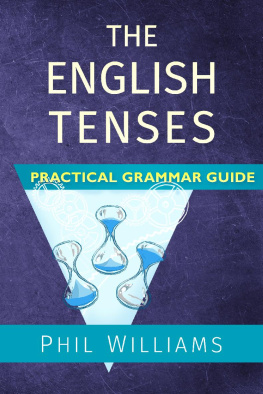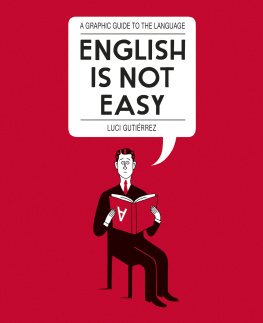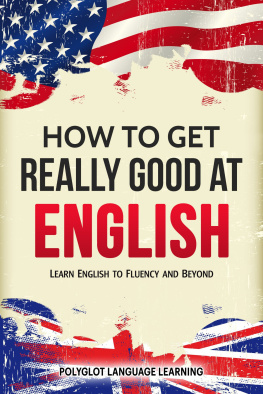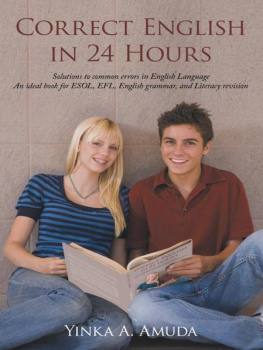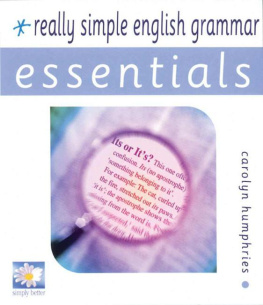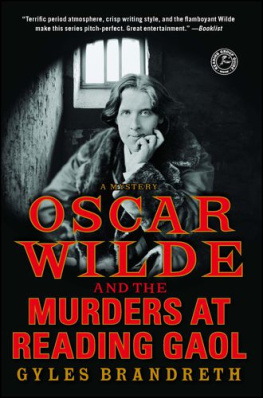Contents
About the Book
Agitated about apostrophes?
Struggling with spelling?
Dithering over dangling participles?
Stumped by the subjunctive?
Relax. Help is at hand
For native English speakers who realise that there is more to good English than meets the eye, but dont know where to start; for parents struggling to explain the finer details to their kids; and for English-language students everywhere this is the only book you need.
Grammar for Grown-Ups guides you through the perils, pitfalls and problematic aspects of the English language, with fun test-yourself sections all the way.
About the Author
Katherine Fry and Rowena Kirton have both worked in publishing for more years than they care to think about. Katherine is a freelance editor mostly working for Random House, Rowena is a managing editorial director at Random House. They live in London.
For
Minne and Lionel
Michael, Tessa, Zachary and Daisy
Enid and John
Andrew, James and William
Introduction
Grammar for Grown-Ups is an accessible, light-hearted and straightforward guide to good English in the twenty-first century, covering grammar, punctuation, spelling, common errors and not so common errors. It is for people who have forgotten the grammar they were taught at school, for those who werent taught it in the first place and for English-language students, because, believe it or not, there is more to life and literature than a rushed-off email and textspeak.
Some of the various existing tomes on the subject often seem to be either too old-fashioned, heavy-handed, pompous and dry, or too jokey, incomplete, occasionally even incomprehensible. This book is not a bossy rant, but hopefully shows that good grammar, punctuation and spelling are more important than many people appear to think these days. In a fast-paced world, when communications jostle for attention, if your letter, email or website page is full of errors, a reader wont waste his or her time trying to work out what youre trying to say it will just be binned, deleted or clicked off along with the annoying flashing ads.
Clearly laid out, Grammar for Grown-Ups comprises six chapters. Chapter 1 focuses on basic grammar; 2 on punctuation; 3 on spelling; 4 on not so basic grammar and tricky areas; 5 moves across the Atlantic to take in US English and then hops over to Australia, New Zealand, South Africa and Canada; and Chapter 6 delves into a more literary field. Dotted here and there are exercises some very simple, some rather less so to see if things have sunk in (and answers are at the back of the book, in case they havent).
Language is constantly developing, and while some rules should remain hard and fast, some may be bent and once in a while even broken when you know what youre doing
K F & R K
September 2012
1 | Basic Grammar
The English language has a deceptive air of simplicity; so have some little frocks; but they are both not the kind of thing you can run up in half an hour with a machine.
Dorothy L. Sayers
I dont want to talk grammar, I want to talk like a lady.
Eliza Doolittle in George Bernard Shaws Pygmalion
JUST AS DELIA thought it no bad thing to go back to the basics of cooking by showing us to how to boil water (or maybe it was an egg), so it is no bad thing to go back to the basics of grammar.
There are nine types of words that make up English grammar: nouns, verbs, adjectives, adverbs, pronouns, articles, prepositions, conjunctions and interjections.
Nouns
A noun is a word used to identify people, places and things. There are four types of nouns: proper, common, abstract and collective.
Proper nouns always start with a capital, or upper-case, letter and so are easy to spot. Proper nouns include names of specific people, places and things like William Shakespeare and Katie Price, London and Scunthorpe, the Black Sea and the Great Dismal Swamp , the Taj Mahal and Wembley Stadium, the Houses of Parliament and Holyrood, September and Thursday.
Common nouns refer to all other types of people, places and things, and start with a small, or lower-case, letter like man, woman, city, dead end, water, mud, building, folly, calendar, autumn, pedant, twit.
Abstract nouns denote an idea, a feeling or a thought, rather than a physical object or thing, something that cant be seen or touched such as anxiety, despair, panic, pride, relief.
Collective nouns are groups of things army, audience, choir, company, couple, family, government, group, herd, pair, panel, parliament, pride, team. They can also be the name (a proper noun) of a company, a team, etc. Square Peg, Manchester City.
Here are 20 nouns. Are they proper, common, abstract or collective?
- bully
- telling-off
- York
- gaggle
- Rose
- rose
- Bill Clinton
- bill
- happiness
- apple
- flock
- tolerance
- Kew Gardens
- crowd
- weariness
- Stonehenge
- litter
- teapot
- luck
- murmuration
Proper or common?
So those are the basic noun categories, but some, of course, encroach on each other. Why does a word like conservative sometimes have a capital letter, and sometimes a small letter? The former, Conservative, relates to the British political party, while the latter, conservative, means reluctant to change, conventional. Similarly, Parliament / parliament (the UK legislature / any other legislature), Bible / bible (the holy book / a book considered the authority on a particular subject), Catholic / catholic (relates to Roman Catholicism / broad-minded dont get the two muddled up ), God / god (the Almighty / all those Greeks and Romans, or a particularly idolised or adored person). Religions are always upper case, even for non-believers.
Although river, valley, mountain, desert, road, street, doctor, king, president, war, etc., are common nouns, they should be capitalised when attached to a name: River Thames, Silicon Valley, Atlas Mountains, Gobi Desert, Kings Road, Oxford Street, Doctor Who, King Kong, President Bush, Iraq War, etc., etc. Similarly, when using a title as a term of address without a name attached, keep the title upper case Well, General, you think this war is a good idea? So you wont give me liposuction, Doctor, you just think I should go on a diet? Ill do the washing-up, Mum. On the other hand, sir and madam should be lower case.
With points on the compass north, south, east and west things get a little murkier. Those points themselves should be lower case, but when attached to continents and countries, they take a capital North America, South Korea, East Africa, West Indies. A named geographical area also has a cap North Yorkshire, South Dakota, East Anglia, West Sussex. For a more general hint at a direction, though, stick to lower case: north Belfast, south London, west of England (although it is the West Country specific area, see previous sentence). Unless referring to the South, meaning the southern states of America, the South or the south, etc., as a geographical area can be either upper or lower case its a matter of personal choice. Which looks better: She lives in the North or She lives in the north?
There are some common nouns that were originally proper nouns, but have become so ubiquitous or common they are now generic terms and lower case, words such as aspirin, biro, escalator, styrofoam, tarmac, yo-yo. However, Kleenex, Sellotape, Thermos, Tupperware, while equally generic, retain that capital letter for the moment Just to complicate things a little bit more, Hoover, Google, Rollerblade, Tipp-Ex and Xerox are nouns, but hoovering, googling, rollerblading, tippexing and xeroxing are .
Next page
